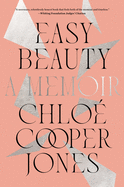Easy Beauty
by Chloé Cooper Jones
The unexpected gift of motherhood and a yearning to live authentically in the present form the undercurrents running beneath Easy Beauty by Chloé Cooper Jones, a genre-defying travelogue and memoir by a gifted writer claiming spaces and embracing identities previously denied to her as a woman with a rare, painful and physically limiting congenital disability. Jones deploys wickedly clever humor to deconstruct some of her most difficult moments, a strategy that alerts readers early on to her endless capacity for grace and intellectual courage.
Easy Beauty is gorgeously crafted as a collage of experiences from childhood to the present day, scenes from a life in which the discomfort of others toward her disability limited Jones's interaction with the world, until the birth of her son, Wolfgang, forced her to critically examine her own defenses and reorient herself toward people rather than away from them. The author had spent her life waiting for people to reach their place of comfort with her physical appearance so that they would forget about it and only then would she be truly seen. She did not share her experiences, especially the cruelty of strangers, with anyone, keeping at a distance even her husband, Andrew, and her closest friends, lest they be negatively impacted by her physical and emotional pain.
"People usually notice my height first. I'm short," Jones says. "Then they notice the way I walk, then that my legs from the knees down and my feet are underdeveloped and disproportionate to the rest of my body. My spine is curved, which makes my back arch forward." Jones has hip dysplasia and she walks by rolling her hips, a painful movement that results in a noticeable side-to-side gait and draws unwanted and often hostile stares wherever she goes. Set apart from a very young age as someone who is not considered a whole person, Jones learned to disconnect by retreating to her mental "neutral room," a place where she could distance herself from the hurt of rejection. As Wolfgang grew, Jones noticed that he was learning to interact with the world by observing her. She used anger, self-righteousness and mental removal to insulate herself from people and hid behind distrust and disdain for all that she was excluded from. But the darkness that she welcomed and hid within was no place for her uncommonly sensitive child, who watched her closely and drank up her moods.
Jones is an award-winning journalist who moved to New York from rural Kansas to pursue a Ph.D. in philosophy. She was a finalist for the 2020 Pulitzer Prize in Feature Writing and is the recipient of the 2020 Whiting Creative Nonfiction Grant. With a philosopher's determined belief in the transformative power of beauty in art, music and nature, Jones decided to leave the safe borders of her Brooklyn home to explore and gain proximity to such beauty. She ventured to countries and cities where she would be confronted daily with reactions to her physical presence, a body visually marked by difference, on her quest to discover a new way of being that could guide and inspire Wolfgang as the able-bodied son of a disabled mother.
The chapters in Easy Beauty melt and flow into one another, linked by meditative musings on philosophical theories of beauty that are scattered throughout Jones's memoir, from the easy beauty of Grecian sculptural symmetry to the difficult beauty that requires time, patience and concentration to uncover. Jones's belief in the power of beauty as an agent of personal change was reinforced while experiencing the communal joy of singing along to opera with rapturous audiences in Rome and by the spiritual deliverance of being in proximity to Beyoncé's "blunt, triumphant beauty" at a concert in Milan. Channeling the ideas of Iris Murdoch (who provides the book's epitaph), Jones allows the beauty of movement she witnesses while watching Roger Federer play tennis in Palm Springs to take her out of herself, replacing self-centered thoughts with "the electric pleasure of seeing someone be so good at something."
Jones's own beauty is discernible only in the right light. "I waited for the new people I met to simply unsee my body, to forget to stare, which happened over time. Enough exposure to me dulled my effect." In order to be accepted as a whole person deserving of the whole range of human desires, she felt she had to make up for her body by being extraordinary in all other aspects of her life. Jones's mother, protective and practical, encouraged her to use her disability as a tool, which led to Jones taking advantage of other people's reductive assumptions about her to get what she wanted.
Humor, brutal honesty and wonder at her "deep, unwieldy love" for Wolfgang inspire a potent narrative as Jones unravels the experiences leading to her gradual inner transformation and growth as a mother and a role model. Easy Beauty finds Jones confronting her own complicity in allowing others to exclude her. "It is hard to leave the darkness and step out into bright and baring light," she declares, granting readers the privilege of observing a brilliant mind set itself blissfully free. --Shahina Piyarali








